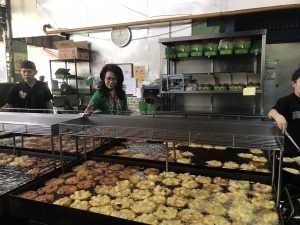People used to call them scorched bananas, poking fun at their black and burnt appearance, but there is more than meets the eye about Mrs. Nanik’s popular banana fritters in Jakarta.
Her fritters are locally known as Pisang Goreng Madu Bu Nanik, meaning Mrs. Nanik’s Honey Banana Fritters. They are a local Indonesian delicacy fashioned out of a frugal mindset, and have become one of the most popular snacks in the country’s capital Jakarta, thanks to the rivalry between Southeast Asian ‘super-apps’ Gojek and Grab.
64-year-old Nanik Soelistiawati created the fritters from her former catering business by using leftover bananas. “Rather than letting them rot and throwing them away, it was better to turn them into an afternoon snack,” she recalled.
Instead of using sugar, since her mother had diabetes, Soelistiawati mixes leftover bananas with a combination of honey, flour, and salt, resulting in a crisp and black and charred snack with a caramelized flavor. She initially prepared them only for family and colleagues, and later on tried to sell them as part of her catering service.
At first, she received many negative comments for how they look. “Many people called them scorched bananas and said they looked bad. No one gave positive comments. But after they actually tasted it, they would like them,” Soelistiawati said.
On her way up
Soelistiawati wasn’t discouraged by the early unfavorable reviews. Instead, she stuck to her novel recipe. In 2007, she started promoting her banana fritters to local bazaars to engage more locals.
Little by little, more Indonesian consumers came to appreciate the bad looking but tasty fried bananas. The demand started to grow. A year later, in 2008, Soelistiawati stopped her catering business to open a small kiosk specializing in selling her banana fritters, for USD 0.5 per portion, in front of her house in West Jakarta.
To drive sales, she also provided her own delivery service limited to the West Jakarta area. At the time, she could sell around five crates of bananas, or around 50 kilograms of bananas every day.

In 2014, Soelistiawati heard about local ride-hailer Gojek’s then planned food delivery service GoFood from her children, Michelle K Molloy and Kelvin Kristarto. She became one of the first local merchants to register on the platform. Gojek eventually launched the service in April 2015.
Only a few people knew about GoFood then, which had just over 40 registered drivers. Slowly but surely, the food delivery platform managed to grow and helped Soelistiawati boost her business by delivering to the whole city, since GoFood would reach all corners of Jakarta, opening a potential 15 million-consumer market for her bananas.
In less than one year, sales took off, and Mrs. Nanik’s banana fritters became one of the most popular items ordered on GoFood. Gojek also benefitted from a 15% cut of each delivery.
Gojek’s rival steps in
In 2016, Gojek’s largest regional competitor, Singapore-based Grab, approached Soelistiawati’s son Kristarto to offer him a deal. Grab, which was expanding its food delivery service GrabFood to Indonesia, wanted to compete directly with home-grown Gojek by luring away its most popular merchants.
Initially, they declined Grab’s offer, and the company came back with a better deal—a lower commission fee than Gojek’s. Soelistiawati couldn’t say no and signed up while still maintaining her store on the Gojek platform. Both platforms helped boost her business. Soelistiawati sold out her fritters more than once when Grab launched aggressive discounts to acquire new consumers.
In only four years, Gojek has grown to have 500,000 food merchants across locations in Indonesia, Vietnam, and Thailand. Food delivery has already surpassed its ride-hailing business, which was the first business segment of the company, as mentioned in September by Gojek’s president Andre Soelistyo at Bloomberg’s Sooner Than You Think tech conference in Singapore.
To date, Gofood processes more than 50 million orders a month across the region, a Gojek spokesperson told KrASIA, adding that merchants have recorded a 3.5-fold increase in earnings or sales even when they continue to operate from the same location.
Gojek’s competitor GrabFood expanded quickly across Southeast Asia last year, after the startup acquired Uber’s regional operations that included UberEats. Grabfood is currently available in more than 200 cities across Indonesia, Malaysia, Singapore, Thailand, the Philippines, and Vietnam. The company claimed that its food delivery segment gross merchandise volume (GMV) grew 900% in June 2019 year-on-year from a relatively small base. Now it’s partnering up with over 200,000 merchants across the region.
Food delivery in Southeast Asia has surged by almost 15 times from 2015 to 2019, growing from less than USD 400 million to a USD 5.2 billion business. The market is estimated to hit USD 20 billion by 2025, which represents a growth of about 50 times over a decade, according to the 2019 Google-Temasek-Bain & Co report.
The same report indicates that the food delivery sector has undergone a fundamental shift in consumer behavior since 2018. It went from being a niche service only used occasionally by a small group of users to a common service for working people and families living in big cities.
Google Trends also recorded that Indonesia’s queries for online food delivery brands have grown over 13 times, the highest number compared to other countries in the region. The Philippines grew nine times, while Thailand eight times since 2015.
Still, the food delivery sector in Indonesia has a lot of room to grow, since food deliveries account for just 1.3% of the total food market, compared to 8% in the U.S. and about 12% in China, according to data from Euromonitor as reported by Bloomberg.
Big plans ahead
Currently, Gojek and Grab account for around 60% of Soelistiawati’s banana fritters sales. Her kitchen, which was only a part of her home yard, now has expanded outside of her home. Soelistiawati also had to hire more employees, from 60 workers three years ago, to over 100.
Every day, she operates her store from 4 a.m. to about 7 p.m. Her business has grown significantly, but she’s always personally monitoring the operations and the food quality, with assistance from her daughter.
“Our banana fritters are sold out every day, and we limit the number of orders to a maximum of 500 per client to make sure that every person can receive them,” she said. Although she declined to provide specific numbers, local media reported that her store sells fritters made out of around 3,000-4,000 kilograms of bananas every day.

Over time, other tech companies and investors have also approached her. William Tanuwijaja, co-founder and CEO of Indonesia’s unicorn Tokopedia, invited her to join his marketplace, and Soelistiawati did, but only for selling other snacks, keeping the banana fritters exclusive to GoFood and GrabFood.
Her famous snacks can now also reach distant areas, such as Bali and Surabaya, thanks to the same-day delivery startup Paxel, after the company’s founder Bryant Christanto personally made a business proposal to Molloy.
Today, Soelistiawati has successfully scaled up her business into more food and snack variants, and has built a food court beside her house. She is also planning to build a factory to mass-produce her banana fritters and reach more customers outside of the Greater Jakarta area.
“Some investors have offered to invest in our business, but we prefer to collect the money and build the business ourselves. We want to succeed from the results of our own sweat,” she said.
